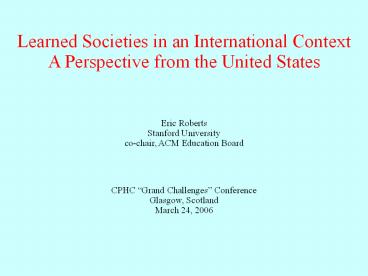Learned Societies in an International Context - PowerPoint PPT Presentation
Title:
Learned Societies in an International Context
Description:
Learned Societies in an International Context A Perspective from the United States Eric Roberts Stanford University co-chair, ACM Education Board – PowerPoint PPT presentation
Number of Views:57
Avg rating:3.0/5.0
Title: Learned Societies in an International Context
1
Learned Societies in an International Context
A Perspective from the United States
Eric Roberts Stanford University co-chair, ACM
Education Board
CPHC Grand Challenges Conference Glasgow,
Scotland March 24, 2006
2
A Stanford-UK Story
Once upon a time, the Financial Times ran a story
comparing Silicon Valley and Silicon Fen
3
A Stanford-UK Story
A year later, we got a visit from a delegation of
MPs
Barry Sheerman Huddersfield, Labour
Chairman Charlotte Atkins Staffordshire
Moorlands, Labour Valerie Davey Bristol West,
Labour Michael Foster Worcester, Labour Helen
Jones Warrington North, Labour Gordon Marsden
Blackpool South, Labour Dr Evan Harris Oxford
West and Abingdon, Liberal Democrat Stephen
OBrien Eddisbury, Conservative Nick St Aubyn
Guildford, Conservative
4
What is a Learned Society?
The term learned society conjures up visions of
the Royal Society, which has several potential
analogues across the pond
Our work in computing research and education is
influenced more strongly by professional
societies and professional associations.
5
Professional Societies in Computing
As all of you who have been involved in IFIP
know, the U.S. has two computing societies
The two societies operate independently, but
collaborate in several important areas, such as
the development of computing curricula.
6
CC200x Series
7
Professional Associations
The ACM and IEEE-CS are organized around
individual memberships. Most top research
institutions (academic and industrial) also take
part in a research consortium
Computing Research Association (CRA)
The CRA is responsible for The Taulbee survey
of research universities The biannual Snowbird
conferences A large number of useful reports
8
Challenges Facing Computing in the U.S.
- Federal funding for research has declined. At the
same time, fewer companies can support academic
research or maintain their own research labs. - The Bush administrations aversion to taxes and
the staggering U.S. debt make funding increases
unlikely. - Science is under attack in the current political
climate, along with the mission of universities
more generally. - Student interest in computing degrees has
declined precipitously in recent years. - The 9/11 attacksand the subsequent appeal to
fear used to bolster support for the Iraq
warhave made it harder for the United States to
attract talented students.
9
Erosion of Research Funding
- Corporate support for research has declined since
the collapse of the dot-com bubble. Although
there are growing opportunities at wealthy
companies like Microsoft and Google, there are
fewer companies supporting university research. - Despite calls for increased funding for science
in the most recent State of the Union address,
actual increases in the NSF budget are small.
Funding for science education has in fact
declined. - Under Tony Tether, DARPA research funding has
become far more mission-directed.
10
The New DARPA Funding Model
- For many years, DARPA invested a great deal of
money in research projects to create autonomous
vehicles. - In the last two years, DARPA put 2M into a prize
instead.
11
The Crisis in Computing Education
12
The Crisis in Computing Education
- The CRA finds that computing enrollments have
fallen between 40 and 50 since 2000. - At UCLA, the number of students listing CS as a
possible major has declined significantly in
recent years, particularly for women.
13
Possible Reasons for Declining Enrollments
- No understanding of opportunities in computing
- Negative image of work in computing fields
- Static curricula that fail to attract todays
students - Growing complexity of introductory courses
- Concerns about job security in the wake of
offshoring - Belief that all jobs vanished with the dot-com
collapse - Students pursuing wealth over good salaries
- Failure to believe statistics showing good
opportunities
14
The No Jobs Fear is Widespread
All this talk about Blue Skies ahead just cant
hide the stark fact that Americans who dont wish
to migrate to India and/or some other off-shore
haven are going to have a difficult career.
Why would any smart American undergrad go into IT
when companies like IBM and HP are talking of
stepping up their off-shoring efforts in the
coming years? They want cheap labor, no matter
the real cost.
I have been very successful in IT, but I
certainly wouldnt recommend it today to anyone
except people who are geeks. . . .
I think the latest figures from the U.S.
Department of Labor are not correct.
15
Crisis and Opportunity
- In this age of technology-enabled globalization
(see Tom Friedmans The World is Flat), the
problems in the United States create
opportunities for the rest of the world. - India and China have seized these opportunities
with a vengeance. There is no reason that
Europe cannot do the same. - Given the current political situation and its
apparent trends, the United States may be unable
to respond to the crisis without this kind of
external pressure. - Economic strength in the rest of the world can
serve as an essential counterweight to U.S.
dominance.































